

Ces neuf hommes et femmes sont l'enjeu le plus important de la présidentielle américaine. Can the US political system survive this farcical presidential election? Policies and government risk being buried in volcanic explosions of personal politics.
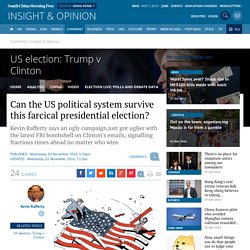
Illustration: Ingo Fast FBI director James Comey broke all precedent and threw a bombshell in the final stages of the US presidential election campaign, revealing that emails possibly involving Hillary Clinton were under investigation. It’s not clear whether this is a stink bomb, smelly and messy but harmless; or a ticking time bomb that may blow up in Clinton’s face, or Comey’s; or worse, something with the potential to devastate the US political system. FBI director James Comey has revealed that a new batch of Hillary Clinton’s emails is under investigation, in the endgame of the 2016 presidential campaign.
Photo: AP Comey’s statement about the discovery of a fresh trove of emails came just 11 days before most Americans vote next week. So why go public, especially when law enforcement agencies normally keep things secret until ready to bring charges? The real objection to Trump is twofold. Why women and minorities matter in US election. Comment: Donald Trump has insulted a myriad of people, but presidential candidates can no longer afford to marginalise the interests of women and minorities, writes Dr.
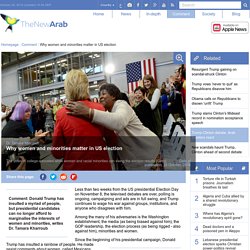
Tamara Kharroub Less than two weeks from the US presidential Election Day on November 8, the televised debates are over, polling is ongoing, campaigning and ads are in full swing, and Trump continues to wage his war against groups, institutions, and anyone who disagrees with him. Among the many of his adversaries is the Washington establishment, the media (as being biased against him), the GOP leadership, the election process (as being rigged - also against him), minorities and women.
Since the beginning of his presidential campaign, Donald Trump has insulted a rainbow of people. Elections and the stock market: History tells us economics matter more than politics. Could it be different this time? Democratic presidential nominee Hillary Clinton and Republican nominee Donald Trump.
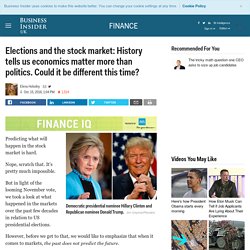
Jim Urquhart/Reuters Predicting what will happen in the stock market is hard. Nope, scratch that. It's pretty much impossible. But in light of the looming November vote, we took a look at what happened in the markets over the past few decades in relation to US presidential elections. However, before we get to that, we would like to emphasize that when it comes to markets, the past does not predict the future. And so we are not making any predictions here about what will happen on the morning of November 9, 2016, or thereafter. Still, it's an interesting exercise to sift through historical data.
How stocks reacted after previous elections Princeton economics professors Alan Blinder and Mark Watson wrote a paper exploring the US economy's performance with respect to US presidents, dating back to Harry Truman. As for the numbers, they noted: Which brings us to the next topic: Democrats vs. US election: How age, race and education are deciding factors in the race for President. US Elections: Civil War Versus Global War? With the U.S. elections just days away, the U.S. public is being presented with two of the least popular presidential candidates in the country’s history.

It is argued that one of them — Donald Trump — would unleash civil war if he wins or loses and the other — Hillary Clinton — would unleash more U.S. wars globally. Présidentielle américaine : que se passe-t-il si un candidat se désiste ? Trump : miroir de l’Amérique ? / Sidi Larbi Cherkaoui, Aurélien Bory et Damien Jalet au Festival d’Avignon. What Is Trumpism? Presidential Election And Republican Donald Trump Give Rise To New Political Term. As Democrats prepare to watch Hillary Clinton take the stage in Philadelphia Thursday evening and accept the Democratic Party’s nomination for the presidency, they will also likely be preparing themselves for four months of hard campaigning and a fight against “Trumpism.”
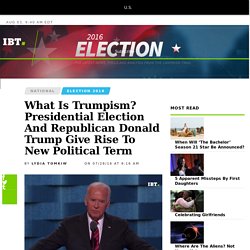
What is “Trumpism” exactly? It’s a term that has started to gain ground with pundits and commentators to describe Republican nominee Donald Trump’s manners, behavior and way of thinking and conducting himself. It's also a hashtag and trending topic on Twitter that has garnered thousands of tweets. Writing in The Hill, political science professor David Tabachnick described Trumpism as being linked to the Republican candidate but also a “uniquely American” political trend that stands apart from traditional American conservatism.
In Tabachnick’s definition, the term encompasses four characteristics: celebrity, nativism, the outsider phenomenon and populism. “Trumpism is not defined by any set of policies, or an ideology. L'élection américaine la plus importante n'est pas la présidentielle. L'enjeu des élections du 8 novembre 2016 n'est pas seulement de savoir qui sera le prochain président des États-Unis.
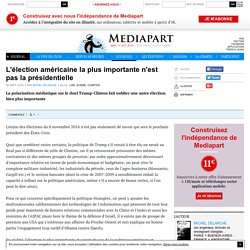
Quoi que semblent croire certains, la politique de Trump s'il venait à être élu ne serait au final pas si différente de celle de Clinton, car il se retrouverait prisonnier des mêmes contraintes et des mêmes groupes de pression: par ordre approximativement décroissant d'importance relative en terme de poids économique et budgétaire, on peut citer le complexe militaro-industriel, les industriels du pétrole, ceux de l'agro-business (Monsanto, Cargill etc.) et le secteur bancaire (dont la crise de 2007-2009 a sensiblement réduit la capacité à influer sur la politique américaine, même s'il a encore de beaux restes, si l'on peut le dire ainsi).
La fin de l’Amérique « gendarme du monde » Par Melina Monjour.Un article de Trop Libre En novembre prochain, le futur président américain sera confronté à un monde profondément instable.

Results / Résultats. Inauguration / Investiture.